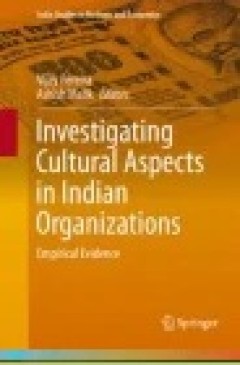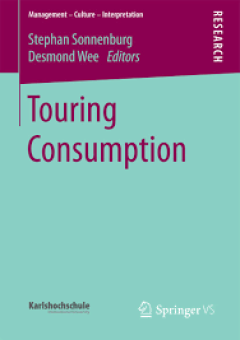Filter by

Iran Revisited: Exploring the Historical Roots of Culture, Economics, and Soc…
This book examines Modern Iran through an interdisciplinary analysis of its cultural norms, history and institutional environment. The goal is to underline strengths and weaknesses of Iranian society as a whole, and to illustrate less prescriptive explanations for the way Iran is seen through a lens of persistent collective conduct rather than erratic historical occurrences. Throughout its hist…
- Edition
- -
- ISBN/ISSN
- 978-3-319-30485-4
- Collation
- -
- Series Title
- -
- Call Number
- -

Investigating Cultural Aspects in Indian Organizations: Empirical Evidence
The purpose of this edited collection is to analyse the cultural aspects of Indian organizations. As the world’s largest and most diverse democracy, Indian society can be best described as an amalgam of multiple cultures, value systems, socio-political and institutional orientations. This book offers a theoretical and empirical basis for understanding the evolving and changing nature of these…
- Edition
- -
- ISBN/ISSN
- 978-3-319-16098-6
- Collation
- -
- Series Title
- -
- Call Number
- -

Tourism in Latin America
This book presents eleven case studies of success about Latin America tourism. The cases are embedded in a framework describing the economic and cultural foundations of tourism development in the continent. Mexico, Brazil, Chile and Costa Rica are some of the Latin countries which have become examples and models for touristic development, respect for the environment and social inclusion. The bo…
- Edition
- 1
- ISBN/ISSN
- 978-3-319-05734-7
- Collation
- XII, 246
- Series Title
- -
- Call Number
- -

Tourism and Hospitality Development Between China and EU
Tourism and hospitality industry is facing a substantial amount of opportunities and challenges due to the globalization. The Third International Conference on Tourism and Hospitality between China and Spain (ICTCHS) provides a unique global forum for academics, thought leaders and key industry practitioners from diverse backgrounds and interests to meet, discuss and debate critical issues that…
- Edition
- 1
- ISBN/ISSN
- 978-3-662-51264-7
- Collation
- XV, 276
- Series Title
- -
- Call Number
- -

Touring Consumption
This book attempts to confront spatial, performative and cultural interrelations between tourism and social economic behavior by providing a critical platform for the articulation of touring consumption in our contemporary world. Tourism has become a significant area of scholarship especially given the industry’s product development opportunities on a global scale. However, the emphasis place…
- Edition
- 1
- ISBN/ISSN
- 978-3-658-10018-6
- Collation
- VIII, 315
- Series Title
- Management – Culture – Interpretation
- Call Number
- -

Strategies for Sustainable Tourism at the Mogao Grottoes of Dunhuang, China
At the Mogao Grottoes, a World Heritage site near Dunhuang city in Gansu Province, visitor numbers have increased inexorably since 1979 when the site opened. A national policy that identifies tourism as a pillar industry, along with pressure from local authorities and businesses to encourage more tourism, threatens to lead to an unsustainable situation for management, an unsafe and uncomfortabl…
- Edition
- -
- ISBN/ISSN
- 978-3-319-09000-9
- Collation
- -
- Series Title
- -
- Call Number
- -

Tohoku Recovery
The March 11 disaster in 2011, known as the Great East Japan Earthquake and Tsunami, caused extensive damage in various sectors. Through the recovery process, special lessons are being learned and applied in the affected region. This book attempts to draw lessons from different issues and sectors such as policy perspectives (both national and local), the role of international NGOs, fishing indu…
- Edition
- -
- ISBN/ISSN
- 978-4-431-55136-2
- Collation
- 20 b/w illustrations, 35 illustrations in colour
- Series Title
- -
- Call Number
- -

Engineering Geology for Society and Territory - Volume 8 Preservation of Cul…
This book is one out of 8 IAEG XII Congress volumes, and deals with the preservation of cultural heritage. In 1972, the World Heritage Convention linked in a single framework the concepts of nature conservation and the preservation of cultural sites. Since then, engineering geology is enlarging its contributions to national and international projects on this topic and is extending its interests…
- Edition
- -
- ISBN/ISSN
- 978-3-319-09408-3
- Collation
- 362 b/w illustrations, 59 illustrations in colour
- Series Title
- -
- Call Number
- -

Mountain Hazards and Disaster Risk Reduction
The Hindu Kush Himalayan (HKH) region is highly vulnerable to earthquakes and water-induced disasters. This fragile mountain region is under tremendous stress from climate change and land-use degradation that has accelerated flash floods, river-line floods, erosion, and wet mass movements during the monsoon period and drought in the non-monsoon period. Against the backdrop of intensifying disas…
- Edition
- 1
- ISBN/ISSN
- 978-4-431-55241-3
- Collation
- XI, 284
- Series Title
- Disaster Risk Reduction
- Call Number
- -

Stochastic Flood Forecasting System
This chapter presents an analysis of land cover and its changes in the Middle River Vistula catchment over the period 1990–2012. The river reach is situated between hydrological gauging stations at Zawichost and at Port Praski (Warsaw). Comprehensive information on land cover and land cover change is a crucial step in understanding and modelling hydrological processes. The land cover and…
- Edition
- -
- ISBN/ISSN
- 978-3-319-18854-6
- Collation
- -
- Series Title
- -
- Call Number
- -
 Computer Science, Information & General Works
Computer Science, Information & General Works  Philosophy & Psychology
Philosophy & Psychology  Religion
Religion  Social Sciences
Social Sciences  Language
Language  Pure Science
Pure Science  Applied Sciences
Applied Sciences  Art & Recreation
Art & Recreation  Literature
Literature  History & Geography
History & Geography